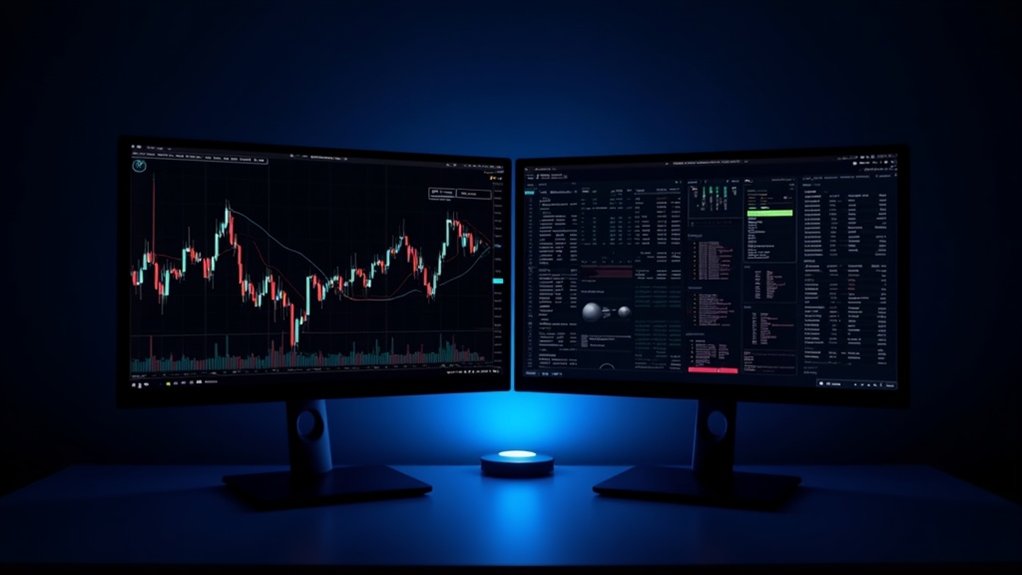Bitcoin dominates the crypto universe with a market cap exceeding $1.6 trillion. It peaked at $114,000 in August 2025 after fluctuating between $70,000-$85,000 earlier that year. Over 420 million people globally own cryptocurrency, with 20% of Americans holding crypto assets. Transaction activity shows market sentiment shifts. Security remains a major concern—crypto crime losses might exceed $16 billion in 2025. The numbers tell a story that keeps evolving every day.
Bitcoin, the undisputed heavyweight champion of cryptocurrency, continues to dominate the digital asset landscape in 2025. With a staggering market cap of over $1.6 trillion, it’s roughly seven times bigger than Ethereum, its closest competitor. That’s not just big—it’s massive.
And yeah, it’s about twice the size of all other top 20 cryptocurrencies combined. Talk about market dominance.
Price-wise, Bitcoin‘s been on a wild ride. It smashed through previous records, hitting $114,000 in August 2025. Earlier in the year, it peaked near $109,000 before doing what Bitcoin does best—fluctuating dramatically.
Prices dipped between $70,000 and $85,000 before bouncing back. Still, Bitcoin’s volatility has actually halved since 2021. Daily standard deviation sits around 2.1%—more like crude oil than those crazy altcoins.
While many alternative cryptocurrencies offer enhanced scalability and smart contracts, Bitcoin maintains its position as the primary cryptocurrency. The total crypto market was valued at over $800 billion in 2022 and is growing at a 12.5% compound annual rate through 2030. More than 420 million people worldwide now own crypto, with projections hitting 1 billion users by 2027.
That’s about 3% of the global population currently, with Americans leading the charge—20% of them (over 50 million) hold crypto assets.
Transaction activity tells an interesting story. Early 2025 saw a decline, with new inputs dropping from 324,000 in January to 311,000 in March. Outputs fell from 339,000 to 312,000.
By mid-April? Recovery mode. Both metrics climbed back to around 316,000. Market sentiment improving? Seems like it.
Bitcoin shows some interesting correlations: +0.49 with high-yield corporate bonds, +0.52 with tech stocks, and -0.29 with the U.S. dollar. It’s both a risk asset and a hedge. Fascinating.
The crypto ecosystem continues expanding, with 89 crypto wallets and a whopping 817 cryptocurrency exchanges worldwide. Among the top cryptocurrencies, only Bitcoin and Ethereum command token prices above $1,000.
Most others? Under $5. Bitcoin isn’t just winning—it’s not even close.
Security remains a critical concern as crypto crime losses could exceed $16 billion in 2025, with the majority of attacks targeting Bitcoin and other high-value cryptocurrencies.
The inauguration of a crypto-supportive administration in the U.S. has significantly influenced market sentiment and contributed to Bitcoin’s recent price surges.
Frequently Asked Questions
How Does Bitcoin Mining Affect the Environment?
Bitcoin mining has a massive environmental footprint.
It gulps down electricity like a thirsty giant—173 terawatt-hours globally in 2020-2021, mostly from fossil fuels. The carbon emissions? Over 85 million metric tons of CO2. It’s like adding a mid-sized country to the planet.
Mining operations expose 1.9 million Americans to harmful air pollution, drain water resources, and claim substantial land.
Those renewable energy claims? Mostly hot air—just 7% comes from solar and wind.
Can Government Regulations Shut Down Bitcoin?
Governments can’t truly “shut down” Bitcoin. It’s decentralized across thousands of global nodes.
No single kill switch exists.
Regulators typically target exchanges and on-ramps instead—the places where crypto meets traditional banking.
They can make Bitcoin harder to access, sure.
More expensive? Definitely.
But eliminate it completely? Not happening.
The network keeps running regardless of what any single government decides. Bitcoin was literally designed to resist this kind of control.
What Happens to Lost Bitcoin Wallets?
Lost Bitcoin wallets are gone for good. Period. When private keys disappear, those coins become permanently inaccessible—frozen in digital limbo forever.
Millions of Bitcoin, worth billions, sit in this crypto purgatory. The funny thing? These lost coins actually make everyone else’s Bitcoin more valuable by reducing supply.
No central authority can reset your password. No customer service to call. Tough luck. The blockchain is merciless that way.
Is Bitcoin Truly Anonymous for Transactions?
No, Bitcoin isn’t truly anonymous.
It’s pseudonymous at best. Every transaction sits on a public blockchain for anyone to see. Forever. While your name isn’t attached to your wallet address, clever analysts can connect dots using exchange data, spending patterns, and IP addresses.
Those privacy-enhancing tools like mixers and CoinJoin? They help, sure, but determined entities with resources can often still trace transactions.
True anonymity? That’s just not how Bitcoin was designed.
How Does Bitcoin Compare to Traditional Banking Systems?
Bitcoin trumps banks at speed and global reach. Transfers happen in minutes, not days. No weekends off. No branches needed.
Traditional banks offer stability and insurance, though. Your money’s backed by governments. Bitcoin? Wildly volatile.
Banks charge hefty fees, especially for international transfers. Bitcoin’s generally cheaper, but network congestion can spike costs.
Both systems have their place. Banks are the reliable sedan; Bitcoin’s the experimental rocket ship. Choose your ride.









